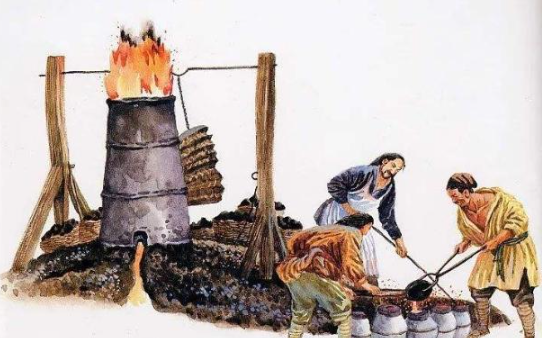 Software Tutorial
Software Tutorial
 Mobile Application
Mobile Application
 Ant Manor, February 21: The idiom 'perfect in one's work' first refers to which kind of craftsmanship in ancient times.
Ant Manor, February 21: The idiom 'perfect in one's work' first refers to which kind of craftsmanship in ancient times.
Ant Manor, February 21: The idiom 'perfect in one's work' first refers to which kind of craftsmanship in ancient times.
php editor Xiaoxin’s topic today is the hot topic in Ant Manor on February 21st: the idiom "perfect in the making" first refers to the heat of which craft in ancient times. This idiom originated from the ancient smelting process and refers to a perfect fire, a clean and even flame, and a blazing fire. In the later evolution, it became an idiom describing superb skills and profound attainments.

Ant Manor Today’s Answer Summary
Ant Manor, February 21: The idiom "perfect in one's work" first refers to the heat of which craft in ancient times?
Question: The idiom "perfect in one's work" first refers to the heat of which craft in ancient times?
Answer: Smelting Bronze

Answer analysis:
1. In ancient China, natural copper was first used. In the early Shang Dynasty, copper-tin alloy bronze could be refined by fire;
2. The process of smelting bronze is relatively complicated. It involves adding the selected ore to the flux first, then placing it in the furnace, burning charcoal to smelt it, and waiting for the heat to mature to obtain the refined copper liquid;
3. The formation and development of ancient Chinese bronzes went through a long period.

The above is the detailed content of Ant Manor, February 21: The idiom 'perfect in one's work' first refers to which kind of craftsmanship in ancient times.. For more information, please follow other related articles on the PHP Chinese website!

Hot AI Tools

Undresser.AI Undress
AI-powered app for creating realistic nude photos

AI Clothes Remover
Online AI tool for removing clothes from photos.

Undress AI Tool
Undress images for free

Clothoff.io
AI clothes remover

Video Face Swap
Swap faces in any video effortlessly with our completely free AI face swap tool!

Hot Article

Hot Tools

Notepad++7.3.1
Easy-to-use and free code editor

SublimeText3 Chinese version
Chinese version, very easy to use

Zend Studio 13.0.1
Powerful PHP integrated development environment

Dreamweaver CS6
Visual web development tools

SublimeText3 Mac version
God-level code editing software (SublimeText3)

Hot Topics
 1387
1387
 52
52
 What are the new ways to accumulate sesame seeds with Alipay's Sesame Credit?_Introduction to Alipay's new ways to increase Sesame Credit
Apr 11, 2024 pm 02:20 PM
What are the new ways to accumulate sesame seeds with Alipay's Sesame Credit?_Introduction to Alipay's new ways to increase Sesame Credit
Apr 11, 2024 pm 02:20 PM
1. We open Alipay, search for Sesame Credit, and click to enter the official mini program. 2. Click Credit Management. 3. Click on Life Record. 4. Here we can see that credit can be accumulated through various methods such as watering trees with energy, saving money, donating eggs in Ant Manor, and walking for charity. If there is something you want to define, you can click below Can't find what you want to do? click here. 5. Here we take the Ant Forest to accumulate energy as an example. We click to record. 6. You can choose the duration and frequency according to your own situation. Click Next when finished. 7. You can set the number of sesame seeds that will be deducted when the task is not completed. Click Agree to start immediately.
 List of answers to Alipay Ant Manor April 15th
Apr 15, 2024 pm 01:22 PM
List of answers to Alipay Ant Manor April 15th
Apr 15, 2024 pm 01:22 PM
List of answers to Alipay’s Ant Manor on April 15th. Friends, Ant Manor will update two questions every day. Today’s questions are “Chicken and rabbit in the same cage”, which is a popular mathematical question in my country. Guess where it first appeared. Food tips in this book: Any of the following vegetables can be eaten raw or cooked. Let me tell you the correct answer below. List of answers to Alipay Ant Manor on April 15th 1. "Chicken and rabbit in the same cage" is a popular mathematical question in my country. Guess which book it first appeared in. The correct answer is: "Sun Zi Suan Jing" 2. Food tips: Which of the following vegetables can be eaten raw or cooked? The correct answer is: White radish Friends, the updated questions in Ant Manor not only allow friends to learn a variety of knowledge, but also participate in charity activities. White radish can be
 Ant Manor April 6: Soaking pineapple in salt water before eating can help
Apr 05, 2024 pm 01:34 PM
Ant Manor April 6: Soaking pineapple in salt water before eating can help
Apr 05, 2024 pm 01:34 PM
Soaking pineapples in salt water before eating will help solve Ant Manor’s April 6 question. Ant Manor’s answer today is to increase the sweetness. Remember to soak pineapples in salt water before eating, which will make them more delicious. Follow the editor for details Let’s look at this Ant Manor Today’s Answer 4.6 Latest 2024, I hope it can help you. Ant Manor Today's Answers Ant Manor April 6 Questions and Answers Question: Soaking pineapples in salt water before eating will help answer: Increase sweetness Analysis: Soaking pineapples in salt water before eating will decompose the organic acids of the pineapple into the water. Makes pineapple taste sweeter.
 Ant Manor April 9: Will the little swallows build new nests every year as winter turns to spring?
Apr 08, 2024 pm 12:30 PM
Ant Manor April 9: Will the little swallows build new nests every year as winter turns to spring?
Apr 08, 2024 pm 12:30 PM
Do the little swallows that come from winter to spring build new nests every year? This is the question asked by Ant Manor on April 9th. Today’s answer from Ant Manor is no. Swallows do not build new nests every year. Follow the editor to read this article for details. Ant Manor Today's Answers 4.9 Latest 2024, I hope it can help you. Ant Manor Today's Answers Ant Manor April 9 Questions and Answers Question: Will the little swallows build a new nest every year when winter turns to spring? Answer: Not necessarily Analysis: Every year when swallows return, they will build a nest in the original place, unless the old nest is stabbed by others. , for the sake of safety, they will find a new place to build a nest.
 Ant Manor April 9: Will the little swallows build new nests every year as winter turns to spring?
Apr 08, 2024 am 09:22 AM
Ant Manor April 9: Will the little swallows build new nests every year as winter turns to spring?
Apr 08, 2024 am 09:22 AM
Ant Manor April 9 question: Do the little swallows build new nests every year as winter turns to spring? Many friends don’t know that the little swallows that come from winter to spring build new nests every year, so the editor below will bring you the answers to Ant Manor’s daily question on April 9. If you are interested, come and find out. Ant Manor Today’s Answer 4.9 Ant Manor April 9: Will the little swallows build new nests every year when winter turns to spring? Question: Do the little swallows that go from winter to spring build new nests every year? Answer: Not sure Answer analysis: 1. Under normal circumstances, a swallow will not build a nest casually, unless its old nest is stabbed by others. For safety, it will find a new place to build a nest; 2. If the old nest is still there, And if it can still live, it will be repaired and it will live; 3. If the swallow does not use
 Ant Manor April 9: The four famous fruits in Lingnan are lychee, banana, papaya and
Apr 08, 2024 pm 12:00 PM
Ant Manor April 9: The four famous fruits in Lingnan are lychee, banana, papaya and
Apr 08, 2024 pm 12:00 PM
The fruits known as the four famous fruits of Lingnan are lychee, banana, papaya and Ant Manor’s question on April 9th. Ant Manor’s answer today is pineapple. I have learned what the four famous fruits of Lingnan are. Follow the editor to find out the details. This article Ant Manor Today's Answer 4.9 Latest 2024, I hope it can help you. Ant Manor Today's Answers Ant Manor April 9 Questions and Answers Question: The fruits known as the four famous fruits of Lingnan are lychee, banana, papaya and answer: pineapple Analysis: lychee, banana, papaya and pineapple are "one of the four famous fruits of Lingnan" say".
 Ant Manor April 9: The four famous fruits in Lingnan are lychee, banana, papaya and
Apr 08, 2024 am 09:28 AM
Ant Manor April 9: The four famous fruits in Lingnan are lychee, banana, papaya and
Apr 08, 2024 am 09:28 AM
Ant Manor April 9 question: The fruits known as the "Four Famous Fruits of Lingnan" are lychee, banana, papaya and? Many friends don’t know that the fruits known as the “Four Famous Fruits of Lingnan” are lychee, banana, papaya and so on. So the editor below will bring you the answer to Ant Manor’s daily question on April 9th. For those who are interested Come and find out. Ant Manor Today’s Answer 4.9 Ant Manor April 9: The fruits known as the “Four Famous Fruits of Lingnan” are lychee, banana, papaya and? Question: The fruits known as the "Four Famous Fruits of Lingnan" are lychee, banana, papaya and? Answer: Pineapple Answer analysis: 1. Banana, pineapple, longan and lychee are known as the "four major fruits of the South". In our country, the main producing areas of these four fruits are located in the south, and southern China is often called "Southern Country".
 List of answers to Alipay Ant Manor April 8
Apr 08, 2024 pm 01:22 PM
List of answers to Alipay Ant Manor April 8
Apr 08, 2024 pm 01:22 PM
List of answers to Alipay’s Ant Manor on April 8th. Friends, Ant Manor will update two questions every day. Today’s questions are: There is a “sun smell” in the quilt that has been dried. Is this the smell of scorched mites? and the following Which early spring flower is known as the "spring flower". Let me tell you the correct answer below. List of answers to Alipay Ant Manor April 8th 1. The sun-bathed quilt has a "sun smell". Is this the smell of scorched mites? Correct answer: No 2. Which of the following early spring flowers is known as the "spring flower" Correct answer: Magnolia friends can also learn a variety of knowledge by participating in answering questions in Ant Manor. Wangchunhua, also known as Xinyi, generally refers to the original white magnolia, also refers to wooden pen, purple magnolia, and is the Magnolia branch. Spring flowers are deciduous shrubs or small trees



